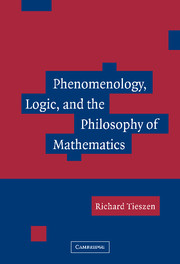Book contents
- Frontmatter
- Contents
- Acknowledgments
- Introduction: Themes and Issues
- PART I REASON, SCIENCE, AND MATHEMATICS
- PART II KURT GÖDEL, PHENOMENOLOGY, AND THE PHILOSOPHY OF MATHEMATICS
- 4 Kurt Gödel and Phenomenology
- 5 Gödel's Philosophical Remarks on Logic and Mathematics
- 6 Gödel's Path from the Incompleteness Theorems (1931) to Phenomenology (1961)
- 7 Gödel and the Intuition of Concepts
- 8 Gödel and Quine on Meaning and Mathematics
- 9 Maddy on Realism in Mathematics
- 10 Penrose on Minds and Machines
- PART III CONSTRUCTIVISM, FULFILLABLE INTENTIONS, AND ORIGINS
- Bibliography
- Index
5 - Gödel's Philosophical Remarks on Logic and Mathematics
Published online by Cambridge University Press: 14 July 2009
- Frontmatter
- Contents
- Acknowledgments
- Introduction: Themes and Issues
- PART I REASON, SCIENCE, AND MATHEMATICS
- PART II KURT GÖDEL, PHENOMENOLOGY, AND THE PHILOSOPHY OF MATHEMATICS
- 4 Kurt Gödel and Phenomenology
- 5 Gödel's Philosophical Remarks on Logic and Mathematics
- 6 Gödel's Path from the Incompleteness Theorems (1931) to Phenomenology (1961)
- 7 Gödel and the Intuition of Concepts
- 8 Gödel and Quine on Meaning and Mathematics
- 9 Maddy on Realism in Mathematics
- 10 Penrose on Minds and Machines
- PART III CONSTRUCTIVISM, FULFILLABLE INTENTIONS, AND ORIGINS
- Bibliography
- Index
Summary
The publication of Volumes I, II, and III of Kurt Gödel: Collected Works (KG: CW) (Feferman 1986, 1990, 1995) marks a major event in the history of logic and the foundations of mathematics. The material included in the volumes not only presents us with a picture of the great scope, depth, and significance of Gödel's accomplishments, but will also open up new avenues of thought and research for future generations of logicians, mathematicians, philosophers, computer scientists, and others who will find Gödel's ideas on various subjects to be of substantial interest. There is an abundance of material to be considered in studying these books, including work on relativistic cosmology, Kant and the philosophy of time, an ontological proof for the existence of God, and Gödel's abortive but interesting efforts late in his career to settle the continuum hypothesis. In this chapter I will focus only on indicating Gödel's main philosophical theses about mathematics and logic; even with this limitation, it will only be possible to scratch the surface.
The bulk of Gödel's technical work in logic and foundations was completed between 1929 and 1943. The most important results are the completeness theorem for first-order logic (1929), the incompleteness theorems (1931), and the theorems on the relative consistency of the axiom of choice (AC) and the continuum hypothesis (CH) (1938–40). From 1943 on, Gödel devoted himself almost entirely to philosophy, but he did not publish most of his work.
Information
- Type
- Chapter
- Information
- Phenomenology, Logic, and the Philosophy of Mathematics , pp. 112 - 124Publisher: Cambridge University PressPrint publication year: 2005
